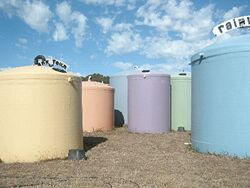
Richard Heinichen and his wife have been collecting rainwater for household use for years. When they started, it was the answer to bad water problems. Since then, they've come to believe rain water is the best water you can get.
The Heinichens had spent money for a well to serve their new home in the Texas Hill Country outside Austin, Texas, only to find the water "rock hard" with a high sulfur content. He says it turned their hair into fright wigs and their jeans into cardboard. The equipment and chemicals needed to treat this water were daunting and the cost was downright prohibitive. They considered hooking up with a private water supplier, but again, they didn't like the prospect of paying hundreds of dollars a month for the rest of their lives for water. Rainwater collection was a last resort.
Despite an initial investment in gutters, plumbing, filters and storage tanks, Heinichen figures rainwater costs less and is better for them than any other water source available to them.
"Now, after years of living with rainwater, we realize choosing rainwater is not 'settling' for less in any sense. Rainwater is 'the gold standard' of water. It has a hardness of zero, tastes fresh, and leaves our faucets and tile sparkling," he says.
In Texas Hill Country, rainfall averages about 32 in. a year. The Heinichens collect everything that runs off the 2,300 sq. ft. roof of their home. That small a collection area may sound a little inadequate, but they actually catch and store more than 40,000 gal. of rainwater in a typical year. That's enough to allow them about 110 gal. of water a day for all purposes.
The experience has turned Heinichen into a rainwater evangelist. He's written a book on catching and using rainwater. He formed a company he calls Tank Town and sells tanks, filters and other equipment related to storing and using rainwater. And he recently became the first and only person selling bottled rainwater for drinking.
Of the bottled water, he has this to say: "My mission was to create a bottled water that captured the taste and sense of the cold, clear stream water I drank in the late 1950's in the California mountains. After years of wrangling with government agencies, we finally agreed on regulations that would allow me to collect and bottle rainwater -- for the first time in the whole United States."
Heinichen says his product has an advantage over other bottled waters: "I don't have to try to convince you that my spring is better than their spring or rely on a gimmick like hauling a glacier behind a tugboat to my bottling plant. Move over spring water, glacier water, whatever water -- this is rainwater and it has never hit the ground," he asserts.
If you're interested in collecting your own rainwater in volumes sufficient for household use, Heinichen can help you determine how much collection area and storage you need and design the right system of filters, pumps and even add ultraviolet water treatment if it's needed.
If you just want a good drink of clean, fresh water, he'll be happy to sell you his "fresh squeezed cloud juice" delivered by UPS anywhere in the U.S. His book, which should help most people design and equip their own system, is also for sale. See his online catalog for tank and equipment prices.
